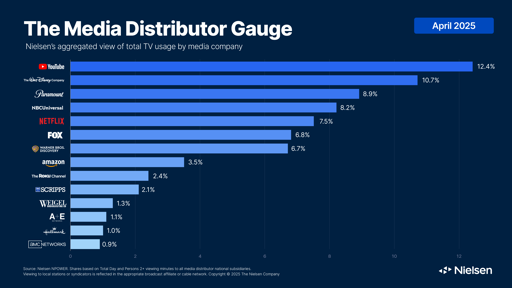Google confirms more ads on your paid YouTube Premium Lite soon
-
Go 20 minutes late my dude
That'll be the one movie they decide to show no prescreening ads lol
-
*By enabling the VIP package in addition, we guarantee to not update the TOS more than once every second.
**for now. Until we change our mind. We reserve the right to change our minds at any point and without notice.
-
That'll be the one movie they decide to show no prescreening ads lol
That happened to me once. I think it was I Heart Huckabees. It started and people were so confused. I half think David O Russel asked them to do it to throw people off.
-
This post did not contain any content.
Well, I'm still happy that my grandfathered $7.99 plan from the GPM days still holds up, fully ad-free.
-
This post did not contain any content.
Youtube ads? I have no clue what you're talking about...
-
Well, I'm still happy that my grandfathered $7.99 plan from the GPM days still holds up, fully ad-free.
Watch your card on file. I had the whole enchalada once and loved using the music app and no ads. Card expired for one payment, sub cancelled, and I fixed it immediately. They wouldn't give it back to me, and refused to refund the larger payment for just Youtube.
-
I would actually pay for YT premium if it was reasonably priced and I think there are many like me. Why are they shooting themselves in the foot?
Same. They should have a lower tier where your first N hours of watch time have no ads. I don't watch a ton, so that would probably convince me to pay.
-
Firefox+uBlock Origin on the computer.
ReVanced on my Android phone.
SmartTubeNext on my Android TV.
I haven't seen a YouTube ad in years.
In case anyone is reading this and using an iPhone, Orion is the only iOS browser afaik to currently support uBlock Origin. I haven’t had a single ad since discovering that. Picture in Picture mode works too, as long as you go full screen with the video before swiping home. Hope this helps someone.
-
This post did not contain any content.
paying for youtube
-
It very much is and is talked about basically nonstop everytime the topic comes up from any content creator that's been in the game for longer then a decade.
The ad based system the internet is built on is unraveling.
content creator on youtube had to resort to patreon, brand deals and promotion to stay afloat.
-
I've recently been getting warning notices on Firefox that "AdBlockers are not allowed on YouTube!" I laugh and continue on.
i actually never got that from youtube, im using ubo, and other adblockers too.
-
Even quicker fix: logout.
Admittedly i'm not a huge youtube watcher, but since logging out there's not a single damned nag when i run a marathon
i dont log in, for the purposes of google gathering more data about you. and also i would get in the habit of commenting on videos, which i dont do anymore.
-
This post did not contain any content.
Wait. I pay for YouTube with my time, the most important resource I have access to. There’s a level where you pay money and STILL SEE ADS?
-
paying for youtube
As all decent people do.
-
This post did not contain any content.
No time like the present to begin creating a European alternative, given the geopolitics of the times.
-
I keep noticing people in this thread recommending UBlock Origin, with others replying that they eventually got a popup to turn off their adblocker.
This is usually followed by replies mentioning they just click X (or add a UBlock filter on the popup), and go on with watching Youtube. No problem, right?
According to Ublock Origin's Redd*t Post, that is just the first warning stage; eventually the presentation of their anti-adblock message becomes more intrusive until you receive the "The in-player message. Playback is stopped."
I should know. I get that message on any Youtube video (while logged in), and it doesn't go away for several hours.
That said, my workaround (extremely hacky) was to find the RSS feeds for all of my channel subscriptions, and then add them to FreshRSS.
That section of my RSS feed essentially acts like a Youtube subscription page, but not tied to an actual account.On my computer: I watch them in a private browser Firefox profile I've dedicated solely to Youtube (and has all of the extensions already installed, of course).
On Android: I watch them using NewPipe.
Why are you censoring the word reddit? Is that a joke?
-
This post did not contain any content.
Youtube has ads? ( ͡° ͜ʖ ͡°)
-
This post did not contain any content.
All the people saying "I'll just stop using it, no big loss," are you only using YouTube for fun? Have you never needed to pass a class, prep for a job, work on a house, learn a skill using it?
It is such a large repository of human knowledge that is so far not widely replicated anywhere else. I rely on it for learning skills to provide for my family, as far as learning other useful abilities.
For example, YouTube taught me how to service my own vehicles. I have a specific set of old 90s Volvo cars, and there is a youtuber (Robert DIY) who does an excellent job documenting how to do maintenance on them. I have done my best to archive everything he posts, but he is just an example, as there are countless other informative tutorials and how-tos posted on YouTube.
As of now, Google has their grips on an enormous amount of practically useful data, and they know it. It's beyond fucked, and to act like it is inconsequential or ignorable is very short sighted.
-
Yes, sure, I just don't want to watch ads. There is really too much of them
I agree. I guess I don’t watch YouTube enough for it to be a big burden. Just mute it for a few seconds.
-
All the people saying "I'll just stop using it, no big loss," are you only using YouTube for fun? Have you never needed to pass a class, prep for a job, work on a house, learn a skill using it?
It is such a large repository of human knowledge that is so far not widely replicated anywhere else. I rely on it for learning skills to provide for my family, as far as learning other useful abilities.
For example, YouTube taught me how to service my own vehicles. I have a specific set of old 90s Volvo cars, and there is a youtuber (Robert DIY) who does an excellent job documenting how to do maintenance on them. I have done my best to archive everything he posts, but he is just an example, as there are countless other informative tutorials and how-tos posted on YouTube.
As of now, Google has their grips on an enormous amount of practically useful data, and they know it. It's beyond fucked, and to act like it is inconsequential or ignorable is very short sighted.
What pisses me off most is that the way the internet works now is that ten years ago, someone who wanted to share about how to service your 90s Volvo that would have written it on a web page with a few photos that would have been quicker, cheaper and easier to write, quicker and easier to read, and cost next to nothing to host.
But because Google control fucking everything, that same person is now heavily incentivized to make it a pointlessly long video instead, that took days to make and edit, and is harder to use while working, and if they don't do that then they ain't getting anywhere near the top of the search results and you weren't going to find it anyway.
It sucks and I can't wait for people to wake up and tell Google to fuck off and stop ruining the internet.






